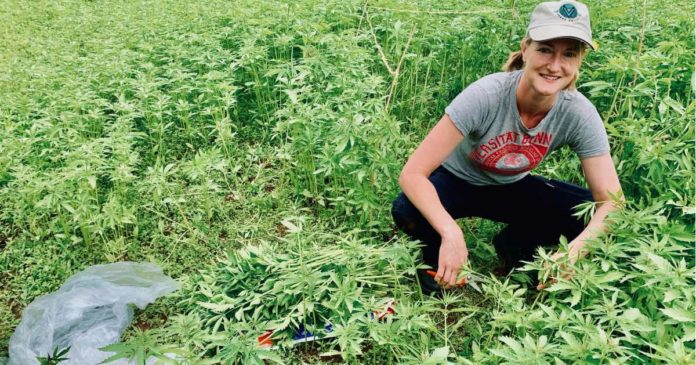A trial carried out in Western Australia is indicating strong potential for hemp to be a good summer feed option for livestock.
There’s a lot of anecdotal evidence that hemp is a great livestock feed, but one of the challenges is regulatory – concerns about how the intoxicating cannabinoid THC may impact animal products. While THC is only present in small amounts in hemp, the fact it exists at all is the main reason it remains illegal to feed it to livestock in many jurisdictions.
This pilot project – announced in February last year – has been led by Western Australia’s Department of Primary Industries and Regional Development (DPIRD) in collaboration with the ChemCentre and Charles Sturt University, and involved 15 Merino wethers (sheep) grazing on hemp stubble.
DPIRD project lead Dr. Bronwyn Blake (pictured above) says there were no adverse effects on feed intake or animal performance – in fact, the results suggested production gains could be attained from sheep feeding on industrial hemp.
The sheep were fed three diets and measured for digestibility, performance and carcass traits. Results indicate digestibility of dry and organic matter were higher for both hemp diets compared with the control.
“The most profound outcome was the increase in minor volatile fatty acids, suggesting an improvement in energy availability and a change in the composition of the gut microbial population, which may account for the improved digestibility,” said Dr. Blake.
The next phase of the project involves investigating potential pathways to market for livestock that have been fed hemp. One of the important aspects to be examined will be the clearance rates for THC.
“Phase 2 will provide valuable insight into the half-life, or breakdown, of THC in sheep and cattle and how long it takes for THC to be eliminated from various tissues in animals fed industrial hemp,” said Dr. Blake.
The research carried out by the team will provide a basis for a potential Industry Code of Practice; perhaps opening up whole plant hemp as a livestock feed option.
The pilot project has been funded by AgriFutures Australia, which was formerly the Rural Industries Research and Development Corporation.


